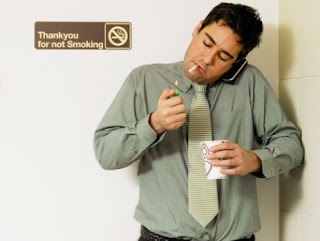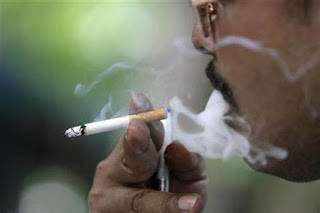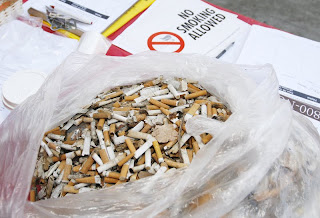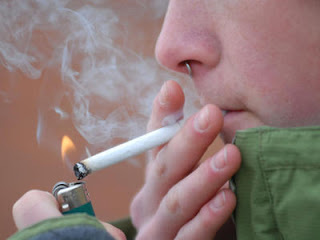
Undergraduate Student Government weighed in on the debate over creating a smoke-free campus Tuesday night by passing a senate resolution calling for the enforcement of designated smoking areas and a clarification of current smoking policy.
The administration will take an official position on changing smoking policy on the University Park Campus once it has heard from the different constituencies for faculty, staff, undergraduate students and graduate students, according to USG Director of Campus Affairs Jared Ginsburg. The other three constituencies’ representatives have passed resolutions, which are used to formally communicate interests to administration.
Residential Senator Marissa Roy, a co-author of the resolution, sees the legislation as an intermediate step toward possibly establishing a smoke-free campus in the future.
“We may be in the direction of becoming a
smoke-free campus one day,” Roy said. “[Clarifying designated] smoking areas will be a first step to gauge reaction and get students used to the idea of seeing smoking limited on campus.”
Nearly 65 percent of 1,485 respondents to a USG online poll supported limiting smoking on campus, according to the resolution. A plurality of about 46 percent of the respondents favored a smoking ban and 40 percent favored a change in the university’s smoking policy that includes clarifying the location of designated smoking areas.
“I support a campus-wide ban on smoking contingent upon USC actually enforcing it,” Matthew Prusak, a freshman majoring in international relations (global business) said. “Smoking poses a health risk and it seems like the right thing to do from a health standpoint.”
USG Senate Speaker Pro Tempore Vinnie Prasad, who cast the only dissenting vote, said the resolution does not address the plurality’s views.
“While I agree with the spirit that we need to clarify all rules, I think we should have considered the 46 percent,” Prasad said.
USG had initially planned to vote on the resolution last week but tabled the legislation to settle confusion between two groups of senators — those who wanted administration to take action and those who wanted to clarify the current policy, Roy said.
The new draft added clauses aimed at clarifying and publicizing current USC smoking policy along with asking the administration to take action.
“Students don’t know what the policy is,” Ginsburg said. “They just don’t understand it. We are calling for a very clear announcement by the administration as to what the policy is and where the university falls on the issue.”
The USC Academic Senate and the USC Staff Assembly, the representative bodies of faculty and staff respectively, passed resolutions in 2010 advocating for a smoke-free campus. The academic senate’s resolution cited research findings and recommendations from the Provost’s Work and Family Life Committee, which conducted focus groups on both campuses.
“It’s not out of the realm of the really possible,” said Christopher Chomyn, a senior lecturer in the School of Cinematic Arts and the committee’s chair. “We are not leading this trend. We are way behind the curve for universities adopting smoke-free policies.”
At least 586 colleges have adopted smoke-free campus policies as of Oct. 7, including schools with large campuses such as the University of Michigan and Oregon State University, according to the American Nonsmokers’ Rights Foundation.
In September, the Graduate and Professional School Senate expressed its opposition to a smoking ban with a strongly worded resolution that called smoking bans “an encroachment of personal rights.”
“The lack of enforceability was a big problem we talked about,” GPSS President Ryan Estes said. “We thought there could be a lot of alternatives to create a healthier campus than a flat-out smoking ban.”
Chomyn, however, said a ban probably wouldn’t be heavily enforced.
“It’s not meant to be punitive,” he said. “It’s meant to improve the general welfare of our community.”
Because of the negative health effects associated with secondhand smoking, some smokers support the enforcement of designated smoking areas despite the inconvenience they cause.
“I’m a smoker, but I agree with the designated smoking areas,” said Jin Yong-Moon, a junior majoring in music industry. “I may harm other people if I smoke in open areas.”
Chomyn said his committee’s research showed opposition to a ban mostly comes from non-smokers, rather than smokers.
“Most of the people who are smokers seem to be in the favor of it, or at least open to it,” he said. “The push back has been from non-smokers.”
Roy also said she hopes the resolution’s urge to clarify policy will mean students learn there are already designated smoking areas on campus.
“Students in the survey were asking for something that already exists, but they didn’t know were already there,” Roy said.
In the coming months, USG will continue to work on expressing the student body’s opinion regarding USC’s smoking policy.
“USG is going to be the stalwart voice of students,” Roy said. “We want to keep our personal views out of it.”
The resolution will remain effective for two senate terms, taking advantage of a new bylaw amendment that allows each senator to submit one strongly supported resolution to the subsequent senate.




























